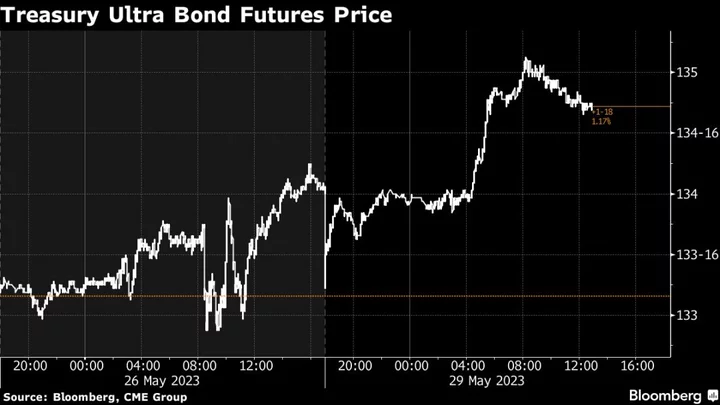Treasury futures linked to the 10- to 30-year part of the US government bond market rallied on light volume Monday, as traders looked ahead to an array of supportive factors that could come into play when trading resumes Tuesday after the Memorial Day holiday.
Those include mounting expectations that the Federal Reserve is likely to raise interest rates again in June or July, and forecasts that the passage of a debt-ceiling bill will unleash a deluge of short-term Treasury bill issuance, draining liquidity from markets and potentially denting the performance of risk assets. Also, this week brings a month-end rebalancing of the US Treasury bond index to incorporate large quarterly new issues of 10- and 30-year debt, which may drive demand for those sectors of the market.
Treasury yields across the maturity spectrum reached their highest levels since early-to-mid-March on Friday, erasing most of the declines spurred by that month’s regional bank failures, which raised the specter of broadly tighter lending standards. The 10-year rate exceeded 3.85%, up from a year-to-date low under 3.25% in April. Yield increases in recent weeks have been led by shorter maturities though, reflecting increased expectations for Fed rate increases.
The debt-ceiling accord may be driving demand for long-dated Treasuries on the theory that it will prove restrictive for the economy, said Andrew Brenner, head of international fixed income at NatAlliance Securities.
“It’s going to be taking money out of the economy at the federal level,” he said. But also, yield levels reached Friday are indicative of short positioning in bonds that causes buyers to be drawn into rallies, he said.
Price action in Treasury futures suggested that long-dated Treasury yields will decline when bond trading resumes Tuesday, while short-maturity yields remain near multi-month highs. The longest-maturity Treasury contract, the Ultra Bond, was higher by 1 basis point at 1 p.m. New York time, when electronic trading on CME Group Inc.’s platform went into a pause state until 6 p.m., the start of the trading day in Asia. Volume totaled about 56,000 contracts, compared with a daily average of 254,000 this year through April.
While congressional approval of the compromise reached by US President Joe Biden and House Speaker Kevin McCarthy remains uncertain, gains may be especially pronounced for Treasury securities that were most at risk of failing to make timely payments to holders. Those include Treasury bills maturing during the first half of June, whose yields had surged last week to over 7% in some cases as some investors opted to avoid them entirely. However, those yields had already begun to come back down on Friday on signs that an agreement was within reach.
The agreement to suspend the debt limit until January 2025 may also spur repricing of US sovereign credit default swaps, derivatives that allow investors to insure against non-payment, which climbed to multi-year highs in the past month. Fitch Ratings warned on May 24 that the US credit score could be downgraded, putting it on negative watch because of the failure to address the debt limit until the federal government had nearly exhausted its cash balance.
With swap contracts as of Friday pricing in more than half of a quarter-point Fed rate increase in June, and fully pricing one in by July, employment data set to be released this week are critical. Job creation exceeded economists’ median estimate in April and each of the previous 12 months. However Fed officials in their public comments have been divided on how to balance an anti-inflationary stance with the possibility that the central bank’s 10 rate increases totaling 5 percentage points in the past 14 months warrant a pause in June.
“The inflation numbers are not cooling enough for the Fed,” Kevin Flanagan, head of fixed income strategy at Wisdom Tree Investments, said Friday. “The market has been pivoting already to a more restrictive Fed, and the shot clock to the June meeting is ticking.”
--With assistance from Benjamin Purvis, Liz Capo McCormick and Michael Mackenzie.
(Adds chart, futures price change and volume.)

